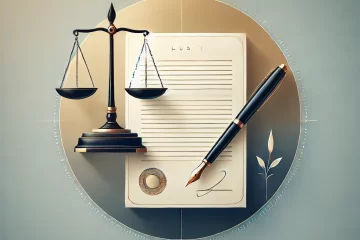![]()
Introduction:
Sections 58-104 of the Transfer of Property Act, 1882, talk about Mortgage. Section 58(a) of the mentioned act defines mortgage as “A mortgage is the transfer of an interest in specific immovable property for the purpose of securing the payment of money advanced or to be advanced by way of loan, an existing or future debt, or the performance of an engagement which may give rise to a pecuniary liability”. The property entered into the deed is known as the Mortgage property.
Mortgage Vs. Pledge
While it may seem at the first glance that pledge and mortgage can be similar and be often interchanged, they have acute differences in the aspects of ownership and type of the asset. Pledge is used for movable assets like fixed deposits, shares, securities, etc. while a mortgage is used for immovable or fixed assets like land, buildings, etc. when an asset is pledged, it is still owned by the individual who had pledged it i.e. he retains the important documents while in the case of a mortgage, the documents are held by the lender. Moreover, it is easy to sell a pledged asset without any hassle while court intervention may be required in the case of a mortgage.
Who can be a Mortgager?
The owner of the property who is mortgaging it as a security against the loan is known as the Mortgager. An individual can be a mortgager if he is not disabled or belongs to a body of individuals or an association. He should not be of unsound mind or a minor while a guardian representing from either category could be considered as a mortgager.
Who can be a Mortgagee?
The person to whom the property is being mortgaged is known as the Mortgagee. A person could be a mortgagee who derives titles and properties for the sake of redemption for the failure of repayment of the debt on the part of the mortgager. He should also be competent i.e. of sound mind.
Essential Elements of a Mortgage Deed
A mortgage deed is a legal instrument that essentially transfers the interest and legal rights of a specific immovable property thereby securing the payment of money in case the debtor fails to pay his debt to the lender. The intention of the parties is always examined, the essential elements like the presence of the debt and the immovable property and the intention to use that immovable property as a security against the loan taken.
Subprime Mortgage
The credit scores of an individual play a vital role in determining whether or not he is entitled to a mortgage. When the said credit scores are unproblematic and good, a mortgage is granted. When the credit scores are indeed low and tricky, a subprime mortgage is granted as the individual would not qualify for the ‘conventional’ mortgage. These types of mortgages are for individuals who have difficulty in maintaining a consistent repayment schedule.
Types of Mortgage Deeds
There are six types of mortgages as mentioned in section 58 of the Transfer of Property Act, 1882, namely, simple, usufructuary, mortgage by conditional sale, English mortgage, equitable mortgage, and lastly Anomalous mortgage.
Simple Mortgage
A simple mortgage is the type of mortgage where the mortgager personally binds himself to repay the debt. In the situation that the mortgager fails to pay, the mortgagee gains the right to sell the specific immovable property that was secured in the first place as security. In other words, he gains the right to sell the property involved but he does not gain a right to possess the immovable property.
Usufructuary Mortgage
A usufructuary mortgage is the type of mortgage where the possession of the specific immovable property is transferred to the mortgagee or the lender by the mortgager when he fails to repay. This is a scenario where the mortgagee is entitled to or is in a position to attain the profits or interests gained through the property. It is also to be noted that there is no personal liability of the mortgager and that the mortgagee cannot sue for sale. This type of mortgage is not prevalent in India. Another distinctive feature of this type of mortgage is that there is no fixed time by which the mortgage is supposed to prevail. The aspect of the difference between a simple and a usufructuary mortgage can be considered as in the case of a simple mortgage, the ownership and the possession remain with the owner of the property whereas that is not the case in a usufructuary mortgage as the Mortgager gains the possession of the property.
Mortgage by Conditional Sale
Mortgage by conditional sale can be considered a situation where the Mortgager ostensibly sells the mortgaged property to the mortgager on a condition that when the mortgager fails to repay the debt by a particular time and date, the sale of the mortgaged property is deemed to be absolute or on a condition that if the mortgager succeeds in the payment of the debt, the sale of the mortgaged property will be considered void and the mortgaged property would be transferred back to the mortgager provided that no such transaction shall be deemed to be a mortgage unless the condition is embodied in the document which affects or purports to affect the sale. This kind of mortgage deed grew popular in India during the Muslim law and was officially given legal recognition by the Bengal Regulation Act, 1978.
English Mortgage
English mortgage is the type of mortgage where the mortgagor binds himself to repay the debt by a certain date and time and the specific unmovable property is transferred to him absolutely. The property is transferred back to the mortgager upon the payment of the debt.
Distinction between English Mortgage and Mortgage by Conditional Sale
The distinctions between an English mortgage and a mortgage by conditional sale is that the transfer of property is absolute from the beginning (until the repayment of the debt) in the case of an English mortgage and is ostensible which later becomes absolute (due to the failure to repay the debt) in the case of a mortgage by conditional sale.
Mortgage by Deposit of Title Deeds (Equitable Mortgage)
An equitable mortgage is also known as the mortgage by deposit of title deeds. It is a mortgage where a loan is provided with Section 58(f) talks about the essential elements that are required to be present in this type of mortgage. Firstly, there should be a presence of debt. The essential element for this type of mortgage would be depositing the title deed with the lender which would act as a security in case the mortgager failed to repay the debt to the mortgagee. It should also be noted that section 96 of the Transfer of property act, 1882, places equitable mortgage being similar to simple mortgages as both these kinds of mortgages can be enforced by a suit for sale of the mortgaged property.
Anomalous Mortgage
An anomalous mortgage is elucidated in section 58(g) of the Transfer of Property Act, 1882. It says that “A mortgage, which is not a simple mortgage, a mortgage by conditional sale, a usufructuary, an English mortgage or a mortgage by deposit of title deeds within the meaning of Section 58 of Transfer of Property Act is an Anomalous mortgage”.
Contents of a Mortgage Deed
After understanding a mortgage deed and the various forms it takes, it is crucial to understand the essential elements present in a mortgage deed. They would be the name and details of the parties present, description of the deed, details of the property, recital stating what each of the parties have agreed to, Habendum, which specifies the rights and restrictions held by the mortgager and the mortgagee respectively, the covenant for repayment, which talks about the mode of repayment, Mortgage clause, Possession, title deeds and clauses like insolvency, redemption, and required documents. Lastly, the mortgage deed must be attested and stamped for legal validity. Sometimes clauses like lease, validity, or amendment clauses are also added.
Rights and Liabilities of a Mortgager
Apart from understanding the elements in a mortgage deed, it is also vital to understand the rights and liabilities of a mortgager and mortgagee, respectively. Sections 60 to 66 of the Transfer of Property Act, 1882, provides extensive information about the rights a mortgager legally holds. The said rights are mentioned below:
Rights:
- Right to redeem (section 60)
- Redemption of Portion of the mortgaged property.
- Right to inspection and production of documents (Section 60 (b))
- Right of a usufructuary mortgager to recover possession (Section 62)
- Right to Accession to mortgaged property (Section 63)
- Right to Improvements to Mortgaged Property (section 63 (a))
- Right to renewal of the mortgage deed (Section 64)
- Mortgager’s power to lease (Section 65 (a))
- Right in case of waste (Section 66)
Liabilities:
Section 65 of the Transfer of Property Act, 1882 talks mentions the various liabilities of a mortgager. For example, it talks about situations where the property is deemed to improve and the circumstances under which a mortgager is liable i.e. he is liable to pay only if the improvement had affected the mortgagee etc. mentioned below are the liabilities of a mortgager.
- Covenant for the title
- Covenant for the defense of title
- Covenant for discharge of prior mortgage
- Covenant for payment of rents
- Covenant for payment of public charges
Rights of a Mortgagee
The rights of a mortgagee are also discussed under sections 67 to 73 of the Transfer of Property Act, 1882. They are mentioned below along with their relevant sections.
- Right to foreclosure and sale (Section 67)
- Right to sue for mortgage money (Section 68)
- Mortgagee’s Power of Sale (Section 69)
- Right to appoint a receiver (Section 69 (a)
- Right to Accession to Mortgaged Property (Section 70)
- Right to lease renewal (Section 71)
- Rights of mortgagee in possession (Section 72)
- rights to the proceeds of revenue sale or compensation on acquisition (section 73)
Liabilities of a Mortgagee
Section 76 speaks extensively on the aspect of liabilities of a mortgage when the mortgage is in possession. Section 67 talks about the instance where the mortgagee has more than one mortgage. According to a few of the liabilities of a mortgagee as specified under section 76 i.e. when the mortgagee is in possession, the mortgagee has a duty to manage the property as a person of ordinary prudence. He has a duty to collect rents and profits of the property to this best endeavor. He also has a duty to pay government dues unless there is a contract to the contrary etc.
Conclusion
Through this article, it can be inferred that a mortgage deed is a legal instrument that contains specified clauses and rights. Meticulousness and comprehensiveness are a part of this legal instrument.



0 Comments